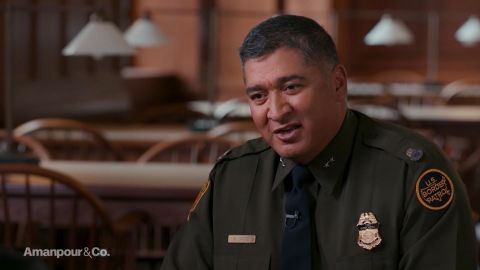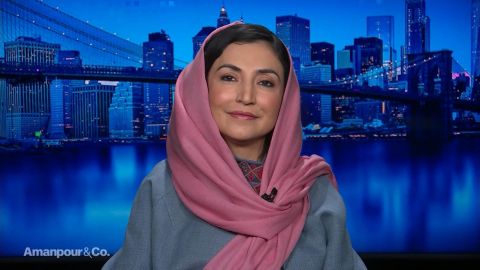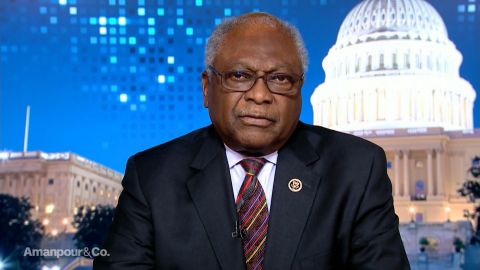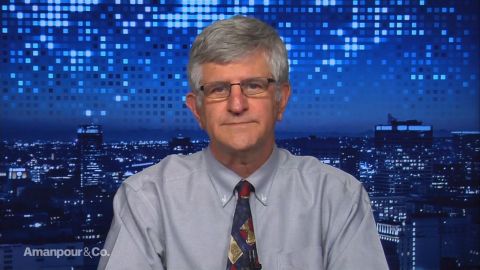Read Transcript EXPAND
CHRISTIANE AMANPOUR: Now, our next guest was singled out in President Trump’s State of the Union address last month. Raul Ortiz has a long history of serving his country. He joined the Border Patrol in 1991 and later served in Afghanistan. Now, thanks to Trump, he’s the new deputy chief of the U.S. Border Patrol. Over his career, he’s witnessed families being torn apart at the border. And Walter Isaacson spoke to Ortiz and his home state of Texas about that and about his support for Trump’s zero tolerance immigration policy.
(BEGIN VIDEOTAPE)
WALTER ISAACSON: Chief, welcome to the show. Thanks for doing this.
RAUL ORTIZ, U.S. BORDER PATROL DEPUTY CHIEF: Thank you for having me.
ISAACSON: And congratulations on your new appointment.
ORTIZ: I’m excited about it.
ISAACSON: So you’re moving from the border up to Washington again. Tell me your backstory from Del Rio, Texas.
ORTIZ: So, grew up in Del Rio. My father grew up in a border community. My grandparents were originally from Mexico. They were born in Mexico, migrated to Del Rio, Texas, which is about 150 miles west of San Antonio. My father, early on, knew that he had to get away from the border community, so he joined the Army at the age of 16, wanted to see the world. And, of course, the army accommodated, sent him all over. He met my mother, who was serving in the Army at the same time, and they got married. And, shortly thereafter, they decided to move us back to Del Rio. My father and my mother encouraged us to be — to serve in the military. It was one of the rules that my father had early on. He said, you will serve. And, of course, me being a bit of a rebel, I said, well, I’m not going to serve right away. I’m going to go to college first. And I did. I went to the University of Texas in San Antonio. But, afterwards, I decided that maybe I should serve. And so both my brother and I joined the Army and served for several years, before we joined our respective law enforcement.
ISAACSON: And you were in Afghanistan for a while?
ORTIZ: I served two tours in Afghanistan in 2009 to 2010. And then, for a year, I worked for Ambassador Richard Holbrooke at the State Department and served at his senior adviser for Department of Homeland Security. And then I went back to Afghanistan a second time as the DHS attache to run our entire Homeland Security mission, and then ultimately ended up coming back to Washington, D.C., as our deputy of operations, and then spent the last six-and-a-half years on the border in Texas, South Texas, from Rio Grande Valley all the way up to Del Rio, as deputy chief and the chief right now. And then I’m getting ready to start my new job.
ISAACSON: So with three generations of both knowledge and emotion about that border, what type of wisdom are you bringing from the border to Washington?
ORTIZ: one of the things that I think I need to share and stress to the rest of America and to the Beltway is that what happens on the border affect those communities. And so the decisions that we make at the national level, we have to take those opinions and those considerations into our thought process. And, for me, I still have an awful lot of friends. My mother is 82 years old, still lives in the border community in Del Rio. And so every decision that we make and that I make, I think, is mindful of the fact that it has a direct impact on those border communities. And so — and it isn’t just about the border communities in Texas. We’re talking about the 2,000 miles on the southwest border, our northern border now that I have to focus on, as well as our coastal sectors in Miami, New Orleans and in Puerto Rico.
ISAACSON: One of the things that truly hugs at the heartstrings of most of the public is the family separation issue. Tell me, have you — when you watch that, when you see a family being separated, do you have any scenes where that’s happened and you just feel, we have got to change this?
ORTIZ: Well, so, I mean, one of the things that and I think America has to recognize about family separations, that if the Border Patrol is involved in a family separation in this day and age, it’s going to be because it’s in the best interests of the child. So we find ourselves in these circumstances and law enforcement finds themselves in these circumstances day in and day out that you may have a parent that may be abusing a child. You may have a parent that may be posing as a parent of a child. And so all of those are situations where we’re going to have to intervene and there may be a family separation. But I will tell you that no Border Patrol agent or law enforcement official wants to purposely separate a mother and a child or a father and a child if they don’t have to. One of the things that we have to also recognize is that we overwhelmed the system. When I say we, I say everybody. The cartels, the migrant population, the lack of government support, all of these things overwhelmed the system back in 2014. And then we did it again in 2017 and 2018. And, for me, as a field commander, as I looked around at the environment, I thought, well, my Border Patrol agents don’t have the luxury of saying, sorry, I can’t process you right now or I can’t take you into custody right now. They were really left with very little recourse as to what their next act was going to be. And that was to take these individuals into custody and do everything they can to process them as quickly as they possibly can. And we did a phenomenal job of doing that. And it took a while for us to get the assistance that we needed. But once we started to get the assistance, and we started to see some policy adjustments, all of a sudden, those numbers started to drop. And so I will tell you that, certainly, it is a difficult situation to see families torn apart, but, on any given day, there are families that are making a conscious decision in Guatemala, Honduras, El Salvador to separate themselves from their children and send them three countries north into the U.S. with a stranger, with a smuggle. And those are environments that I don’t know that we’re taking into consideration. And so we need to figure out a way to prosecute those smuggling organizations and those criminal organizations that are taking advantage of the situation as it exists right now.
ISAACSON: I know you have policy you have to follow. But, tell me, is it heart-wrenching, because you know it so well?
ORTIZ: Yes, most definitely. As a father, as a grandfather, certainly, dealing with the humanitarian aspect of our mission set is awfully, awfully complicated. But it is also a very emotional, a taxing issue that our officers and our civilian staff take very seriously. One of the things that I think the rest of America fails to realize is that you can come down and visit, or you may watch a particular news scene of something that’s happening in that border environment, but that’s just a snapshot of exactly what’s happening. Our Border Patrol agents, the men and women that we represent, live and breathe this day in and day out. And they work in these processing centers, and they deal with these unaccompanied children and these family units daily. And then they have to go back to their own families and try and resolve those emotions between those two settings. And so, for me, what I want to be able to do is let people know that we’re working out there in these environments with a tremendous amount of humanity for our fellow citizens. We’re also doing it for even the people that we encounter in between the ports of entry that perhaps may have broken an immigration law or even something even more serious, if they were smuggling narcotics. I want to be able to tell that story through our lens, and so, that way, everybody understands that the Border Patrol agents that are out there putting their life on a line on a daily basis, that they do it with very little fanfare, expectation, and so you have got to be able to balance that environment. And I think our Border Patrol agents do a tremendous job.
ISAACSON: Can you give me an example or a scene where you, yourself, saw something, and it really just affected you emotionally?
ORTIZ: Yes. One of the things that really took a toll on me, it was about 2014, right after the unaccompanied children crisis really started to surface and become a national news item. We were out in the field. And we had encountered a minor that was under the age of 7. And the only thing she had that allowed us to identify her, because — you know, was a piece of paper that said, “My name is” and a phone number. And I thought to myself, how desperate did that family have to be to allow this young lady to travel through three countries with somebody that they didn’t know? And seeing the security that the young lady felt when she was able to recognize that we were law enforcement officials there, and there wasn’t going to be any harm done to her. Later on, we found out that that young lady had been through a tremendous ordeal over the last four, five days. And so, for us, that happens on a daily basis, whether it’s in South Texas, California, or Arizona. And so all of those stories and those episodes that happen out there, they’re just — they take an emotional toll on you. You have got to take that home and you have got to process that. And you have got to reconcile that against the fact that, hey, the job I’m doing out here is awfully, awfully important, not just to me, but to the communities that I represent and to the rest of the nation.
ISAACSON: I think there were about 76,000 unaccompanied minors came through last year, came to the border last year, and that was an increase of more than 50 percent. And now you say it’s going down in the past few months. What caused it to spike? What’s causing it to go down?
ORTIZ: Well, traditionally, the Border Patrol has seen seasonal movements, trends. One of the things that has certainly reduced the numbers has been the migrant protection protocols. This has allowed us to process these family units and these individuals, and then retain them in Mexico with the shelter facilities, so, before they hear — the immigration hearing is heard in the U.S. And so we have an able to institute this process in California, South Texas, El Paso, and in Arizona. And it’s had a dramatic impact on the amount of people that are crossing illegally. What it’s also done is reduced the amount of people that have placed their lives in the hands of the smugglers. We have seen our rescue numbers drop, and we have seen the deaths along the immediate border also drop. And so those are important statistics for me, because the last thing we want to do is have a loss of life out there.
ISAACSON: You have been working the border for 29 years, let’s say. How has it changed under President Trump?
ORTIZ: I will tell you that the men and women at the Border Patrol feel like they do have an awful lot of support from the administration. We have — like I said, over the last six or seven years, have taken a bit of a beating on several fronts. And the Border Patrol has been around since 1924. And we have got a long standing of honor and serving with integrity. The president has made multiple trips down to the border in California, Arizona, and South Texas. He has demonstrated an awful lot of interest as to what’s happening in the border environment. And I think our front-line officers recognize that.
ISAACSON: What would you change, though, in terms of the tone coming out of Washington?
ORTIZ: Well, certainly, across the board, I think we need to work towards more inclusiveness and make sure that we’re listening to the men and women that are out there performing the job on a daily basis. There’s got to be some changes. I have talked about, at one point, we had this humanitarian crisis, and then we had this morning — that was creating the border security crisis. But, all along, I think, more importantly, it really revolved around a policy crisis. And that’s one of those things that I want to encourage in my new position in Washington, is to work on some of the policy issues that are out there, so, that way, we can ensure that we don’t face this same problem set five years down the road, 10 years from now, because I do think that we have an opportunity to solve some of the immigration issues out there.
ISAACSON: What would you do to solve them?
ORTIZ: Certainly, I think we have an immigration population that’s already in this country that we need to make some decisions on. You can take DACA, you can take all these issues, and I think there’s an opportunity to right the system, so to speak.
ISAACSON: In other words, one component would be some pathway to some legal status for people in the country?
ORTIZ: Yes, most definitely. And then the second thing, I think, you have to ensure that, hey, we’re going to secure our border and discourage folks from taking advantage of these loopholes, these legislative loopholes that exist right now. And so I think it’s not just a two-legged stool. You have got to have the third leg and encourage these other governments, the capacity-building that has to happen in these other governments, because somebody shouldn’t want to spend $4,000 to a smuggler in Honduras, when they can invest that $4,000 in their own country to make Honduras a little bit better place. I have traveled in South America, and I have seen — and Central America — and I have seen some of the situations that exist down there. And so I want to make sure that we are working with our foreign aid agencies to ensure that those countries have the resources that they need to make those situations a little bit better for themselves.
ISAACSON: Do you think you need more of a wall or fence to be built?
ORTIZ: Yes, definitely. I’m a big fan of the infrastructure system. I know it’s not just a fencing system. It’s the roads that go along with it. It’s the sensors. It’s the technology. All of that plays into our border security apparatus or enterprise that we want to install on these border environments. But I also recognize that it isn’t the silver bullet. You can’t just have fencing and say, OK, we can walk away from the border environment, because I think you need those front-line officers out there to be able to respond. I think you need technology in those more remote areas where fencing may not make as much sense. And so it isn’t a cookie-cutter approach to this. I think our field commanders know it best. We have nine sector chiefs on the southwest border, and the equivalent on the northern border. And we quite often ask them, what do you need resource-wise? And they tell us. And I can tell you, we have 2,000 less agents than we had probably 10 years ago. And so we need to increase our staffing levels. And so, yes, definitely, resourcing is going to be a big part of my new job.
ISAACSON: There’s been proposals from the White House to use the Border Patrol and others as a part of elite forces that would go into sanctuary cities. Is that something that the U.S. Border Patrol is trained and should be doing?
ORTIZ: So, once again, I have been a Border Patrol agent for 29 years, and we have served all over. Any time there’s a natural disaster, an event that happens, our Border Patrol agents are some of the first ones to be called, even in this city. I was a commander of the Hurricane Harvey response effort back several years ago. If another agency asks our Border Patrol agents, especially our special operations detachments, for assistance, quite often, we’re going to assist them. I have seen some of the media reporting on what’s occurring. And I will tell you that our special operations detachments are some of the best law enforcement trained personnel in the country. And if they’re asked to do a particular mission set, I have all the confidence that they’re going to be able to execute that job.
ISAACSON: Chief, thank you.
ORTIZ: Hey, thank you.
About This Episode EXPAND
Vaccinology expert Dr. Paul Offit breaks down the consequences of the coronavirus. Vaccinology expert Dr. Paul Offit explains the consequences of the coronavirus and why it will be hard to contain. U.N. ambassador Adela Raz explains negotiations between the Afghan government and the Taliban. Deputy Chief of the U.S. Border Patrol Raul Ortiz discusses immigration policy with Walter Isaacson.
LEARN MORE



